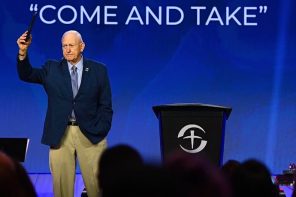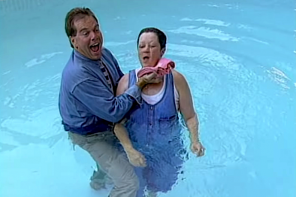After being leaked for weeks, the Pentagon’s official report about the lifting of Don’t Ask, Don’t Tell is finally out and it shows just what the leaks revealed: the vast majority of those in the military see no problem with allowing gays and lesbians to serve openly.
Still, the American Family Association and other religious right groups continue to protest that the religious freedom of chaplains and soldiers who object to serving alongside gays or lesbians will be impaired.
The Pentagon’s report dismisses those arguments, pointing out that those with divergent religious views are already serving compatibly side-by-side. Adding homosexuality to the mix should cause no new problems:
However, the reality is that in today’s U.S. military, people of sharply different moral values and religious convictions – including those who believe that abortion is murder and those who do not, and those who believe Jesus Christ is the Son of God and those who do not – and those who have no religious convictions at all, already co-exist, work, live, and fight together on a daily basis. The other reality is that policies regarding Service members’ individual expression and free exercise of religion already exist, and we believe they are adequate. Service members will not be required to change their personal views and religious beliefs; they must, however, continue to respect and serve with others who hold different views and beliefs.
The argument that chaplains will be muzzled is also laid to rest in the report:
Existing regulations state that chaplains “will not be required to perform a religious role…in worship services, command ceremonies, or other events, if doing so would be in variance with the tenets or practices of their faith.” At the same time, regulations state that “Chaplains care for all Service members, including those who claim no religious faith, facilitate the religious requirements of personnel of all faiths, provide faith-specific ministries, and advise the command.
Interestingly, the Pentagon study notes that there was stronger resistance to racial integration in the 1940s and 1950s than to the open service of gay and lesbian troops.
Surveys of troops back then revealed many of the same objections as today. Harvard professor and author Peter Gomes, in an op-ed in the New York Times in 1993, after DADT first passed, noted a few of them:
In 1942, the General Board of the Navy was asked by Admiral Knox to consider “enlistment of men of colored race in other than mess-man branch.” In its report to the Secretary of the Navy, it asked, “How many white men would choose, of their own accord, that their closest associates in sleeping quarters, at mess, and in the gun’s crew should be of another race? . . . The General Board believes that the answer is ‘few, if any’ and further believes that if the issues were forced, there would be a lowering of contentment, teamwork, and discipline in the service.”
The AFA’s objections sound eerily familiar:
” … there is no question that repeal will have a harmful effect on morale and cohesion. Repeal will have a harmful effect on recruitment and retention …”
“The commandant of the U.S. Marine Corps, Gen. James Amos, has pointedly said that the Marines he has talked to almost unanimously oppose repeal. General Amos said this is about ‘unit cohesion, it’s about combat effectiveness.’ No policy change should be made that does not improve readiness, and it is clear that allowing open homosexuals to serve will have the opposite effect. It will weaken rather than strengthen our military.”
Of course, none of those fears came to pass. As today’s Pentagon study notes: “[B]y 1953, 95 percent of all African-American soldiers were serving in racially integrated units, while public buses in Montgomery, Alabama, and other cities were still racially segregated.”
AFA’s talking points on the trumped-up religious freedom issue are still having an effect on those who have a vote in the repeal. Even Democratic Senator Mark Pryor of Arkansas echoed AFA’s talking points, saying, “If the policy is changed, what impact does that have on chaplains?” Pryor asked. “Does it impede a chaplain from doing what he thinks is his duty to God and country?”
With talk like that from a Democrat it’s easy to see why repeal of DADT is far from a done deal in the lame duck Congress.




